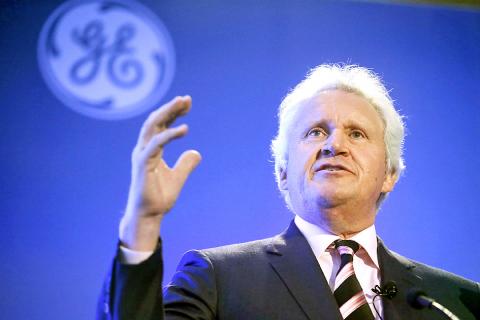General Electric Co (GE) chief executive Jeff Immelt is pledging to spend US$50 million on a series of initiatives in Boston, including US$25 million on government schools, as his company prepares to move its headquarters to the city.
The announcement came as Immelt joined Massachusetts Governor Charlie Baker and Boston Mayor Marty Walsh on Monday to unveil more details about the company’s decision to move its headquarters from Fairfield, Connecticut.
GE is to occupy two buildings and build a third in Boston’s Fort Point neighborhood.

Photo: AP
Immelt said the move would create about 4,000 temporary and permanent jobs.
Immelt said the company plans to move into temporary offices in August and ultimately bring 800 new workers to the area.
He predicted the move would inject more than US$1 billion into the local economy.

Photo: AP
Immelt said the company was drawn to Boston because of its determination not to lose out to Silicon Valley on the growth of the “industrial Internet.”
“The other thing I like about Boston is that you have a chip on your shoulder,” Immelt said. “I love that.”
Baker said GE and Massachusetts are a good match.
He said that 40 percent of workers in the state are part of the “innovation economy.”
Baker predicted that other companies would relocate to the Boston area in part because GE is doing so.
As part of the US$50 million package unveiled on Monday, Immelt said GE would fund a career laboratory to help prepare students for jobs using advanced manufacturing technology.
The company would also spend US$15 million on community health centers and US$10 million to expand diversity in the healthcare, science and technology fields.
Protesters gathered outside the press conference to highlight the millions of US dollars in tax breaks and public incentives, including the prospect of free rent on city-owned land, used to lure the company to Boston.
Susan Strelec, a 70-year-old protester from the city’s Jamaica Plain neighborhood, braved snow, wind and icy sidewalks in front of the high-rise office building where the press conference was being held to voice her concerns.
Strelec said the city and state should be more focused on improving schools, shelters for homeless people and fixing public transportation rather than offering sweet deals to big corporations.
“I hate injustice. I hate corporate greed. I hate stupidity,” said Strelec, a member of the Massachusetts Alliance of HUD Tenants, one of the groups protesting the agreement.
Walsh defended the deal, saying it would end up generating more tax revenue by renovating the two warehouses on city-owned land, rather than letting them remain as they are for the next 10 to 15 years.
Walsh also pointed to the US$25 million pledge to Boston schools by GE, which he said was a direct result of the deal.

UNCERTAINTY: Innolux activated a stringent supply chain management mechanism, as it did during the COVID-19 pandemic, to ensure optimal inventory levels for customers Flat-panel display makers AUO Corp (友達) and Innolux Corp (群創) yesterday said that about 12 to 20 percent of their display business is at risk of potential US tariffs and that they would relocate production or shipment destinations to mitigate the levies’ effects. US tariffs would have a direct impact of US$200 million on AUO’s revenue, company chairman Paul Peng (彭雙浪) told reporters on the sidelines of the Touch Taiwan trade show in Taipei yesterday. That would make up about 12 percent of the company’s overall revenue. To cope with the tariff uncertainty, AUO plans to allocate its production to manufacturing facilities in

Taiwan will prioritize the development of silicon photonics by taking advantage of its strength in the semiconductor industry to build another shield to protect the local economy, National Development Council (NDC) Minister Paul Liu (劉鏡清) said yesterday. Speaking at a meeting of the legislature’s Economics Committee, Liu said Taiwan already has the artificial intelligence (AI) industry as a shield, after the semiconductor industry, to safeguard the country, and is looking at new unique fields to build more economic shields. While Taiwan will further strengthen its existing shields, over the longer term, the country is determined to focus on such potential segments as

TAKING STOCK: A Taiwanese cookware firm in Vietnam urged customers to assess inventory or place orders early so shipments can reach the US while tariffs are paused Taiwanese businesses in Vietnam are exploring alternatives after the White House imposed a 46 percent import duty on Vietnamese goods, following US President Donald Trump’s announcement of “reciprocal” tariffs on the US’ trading partners. Lo Shih-liang (羅世良), chairman of Brico Industry Co (裕茂工業), a Taiwanese company that manufactures cast iron cookware and stove components in Vietnam, said that more than 40 percent of his business was tied to the US market, describing the constant US policy shifts as an emotional roller coaster. “I work during the day and stay up all night watching the news. I’ve been following US news until 3am

COLLABORATION: Given Taiwan’s key position in global supply chains, the US firm is discussing strategies with local partners and clients to deal with global uncertainties Advanced Micro Devices Inc (AMD) yesterday said it is meeting with local ecosystem partners, including Taiwan Semiconductor Manufacturing Co (TSMC, 台積電), to discuss strategies, including long-term manufacturing, to navigate uncertainties such as US tariffs, as Taiwan occupies an important position in global supply chains. AMD chief executive officer Lisa Su (蘇姿丰) told reporters that Taiwan is an important part of the chip designer’s ecosystem and she is discussing with partners and customers in Taiwan to forge strong collaborations on different areas during this critical period. AMD has just become the first artificial-intelligence (AI) server chip customer of TSMC to utilize its advanced